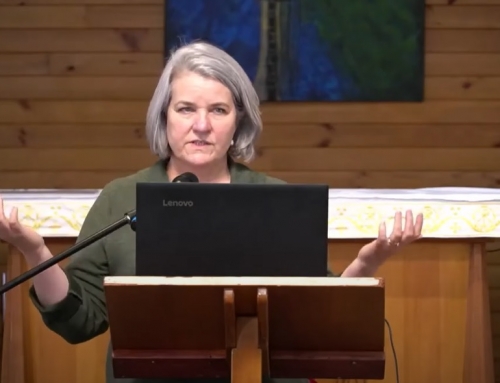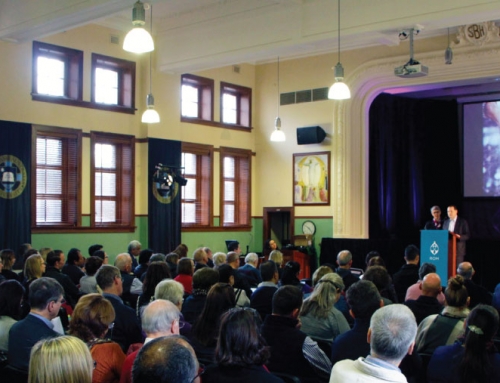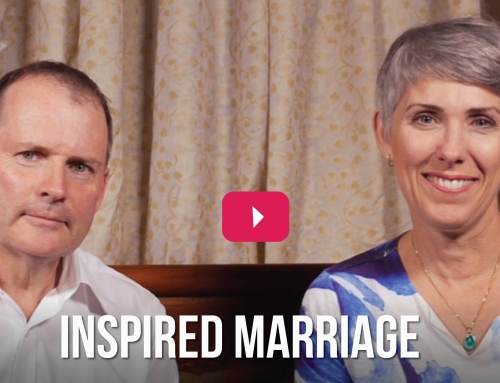In this is an edited excerpt from “One Flesh” by Fr Chuck Gallagher, SJ, (Ch 2), he challenges the culture of individualism.
Callenging the ‘I’ mentality
It’s very fashionable today to proclaim the statement that no man is an island. But what we reduce that truth to is that I have a relationship with other people in order to discover me. That simply is not true. What happens in those circumstances is that I never really get into relationships, that I just get a counselor or an aide, or I organize a posse to chase the fugitive which is myself.
So all my energy, all my talents, all my concentration goes into a constant interior weather report. Where am I? How do I feel about myself? How do I judge I’m developing? How do I see my life as fulfilling? Are you meaningful to me? How am I growing as a person? Are you helping me to be fulfilled? Is what I am doing for you fulfilling me? We minimize the sense of other in our life and maximize “I”.
Of course we’re bound to fail. The more we concentrate on where we are, the more we discover where we’re not. The greater our emphasis on discovering what we have, the more heightened our consciousness is of what we haven’t. We’re made for others, not for ourselves, and it is by being for others that we most fulfil ourselves.
We’re not, of course, denying the importance of self-identity and a certain basic ego strength in order to lead a fulfilling life. What we’re saying here is that we’re going about it the wrong way. We best discover ourselves in the reflection of love rather that in an interior search.
Sacraments as Relationship
There can be no understanding of Church, much less of the Sacrament of Matrimony, in an environment which calls each of us to develop fully as individuals and then subsequently to talk about relationships. For the Church and each one of the Sacraments is an experience of relationship. Sacraments are not private individualistic experiences.
Our relationships must determine our personhood – not vice versa. It is other people who tell us who we are in the most positive and affirmative terms. It is those who love us and who are loved by us who can most reveal our identity to us; most obviously our parents and the other members of our family and then all the other love relationships, especially the marital one.
Instead of concentrating on me, I’ve got to start concentrating on you and us. Otherwise there is no hope for me. If it’s just me that’s looking at me and telling me who I am, then it’s narrow and myopic and very definitely limited and restricted. There is a richness that others bring to the revelation of who I am that I could never achieve by myself.
We tell ourselves that the most important question in life is self-identity – “Where am I going: What will give meaning to my life?” Who am I? What is my life all about?” There is no way to answer those questions until we answer two other questions. “To whom do I belong?” And, “Who belongs to me?” So many of our young adults say: “I don’t belong to anybody and I don’t want to.” That’s why they are lonely; that’s why they’re alienated. Nor is such alienation restricted to the young. All elements of the Church – religious, laity and priests, are deeply and painfully experiencing the cry of the lonely heart: “Who am I?” and “What is my life all about?” So we keep searching. Because we want to be ourselves. And as long as I am myself, I’m nobody.
I only discover my true self in the eyes of someone who loves me. I can never discover myself by looking within. I have to take your revelation.
For even as Church persons we look on ourselves as individuals created in the image and likeness of God. We’ve got to recognize that that’s not Biblical. Actually scripture tells us: “In the image of God he created them, male and female he created them”.
Consequently the individual person by him or herself is not the best image of God, because God is not an individual person. God is persons in relationship. So that passage in Genesis is very, very significant and carries a wealth of meaning for us all. And it’s specifically in our ordination to relationship with one another in the Sacrament of Matrimony that we most image God. That is the ultimate and most complete male-female relationship. Our highest dignity is the fact that we mirror God, which we are the highest form of creation in this world and we are made in his image and likeness. But we are not made in him image and likeness as isolated individuals.
Just the very terms, male and female, to start with, are relationship terms. I’m not a male by myself. We simply cannot define male or femaleness without reference to the other sex – which is exactly why that whole reality is such a beautiful imaging of God. I cannot define God the Father without reference to the Son. His very nature is relationship. So, the very nature of man is relationship to woman. Scripture very definitely connects them in terms of our very imaging of Almighty God.
Sacramental Signs
When we talk about Sacraments, we have to consider them as signs. But again, signs are only effective in terms of relationship. Signs don’t work unless there are others. So when I look at the Sacrament in terms of what I’m getting out of it and what it means to me and how it affects my life, then I’m really missing the whole point. This, of course, goes back to the fallacy that a Sacrament is something done to me rather than that I am a Sacrament who am FOR the people of the Church.
So consequently, instead of saying, “What does it do for me?” I have to be asking myself, “Who do I want to be for these fellow believers of mine?” “What do I want to be saying by who I am in the midst of this community?” “How do I want to reveal the presence of the Lord in their midst?” “How am I responding to their call?”
And it is their call, not mine. I don’t establish what the message of the sign is. That has been determined by the Lord. So I have to face two things. Firstly, I have to ask myself what I am communicating to my brothers and sisters in the faith by becoming this sign, this Sacrament. Secondly, I have to face into the fact that they are calling me to be this sign – it is not I who have determined that I should be a sign, nor have I determined what that sign is. So am I willing to respond to them on their terms? That is very significant.
For example, I might believe that the word “light” means something that is bitter and distasteful. But that is a distortion of meaning if I’m speaking English. I don’t communicate anything that way because people understand it completely differently. So too with the Sacraments.
Sacraments are the language of the Church, so I have to take the community’s definition of what the Sacrament means and not just establish my own.
A Common Language
There has to be a sense of personhood, however, to have a common language. Unless people are in communication with one another on a regular basis, they’re not going to develop a language for use among themselves. Language, after all, is meant to communicate. It’s meant to build communities. Unless there’s a common desire among a group of people to be community, then no common language develops. That’s one of the difficulties of the Church today. Because we’re not a community, we don’t have a common language. And signs only communicate to others when we speak a common language or at least understand common symbols.
The Sacraments are not a disembodied gift from the Lord. They are calls to relationship with my fellow Catholics. They are the language of my family, and if I’m going to speak that language it’s for the sake of being in communication with this family and not just for the sake of having the capability of speaking another language just for my own individual self-advancement and perfection. Sacraments are in, of, and for the Church, this believing community. They are established specifically in order to enable us to build a deeper sense of communion with one another in the Church.
So often we look on Jesus as disembodied. We do not see accepting the Sacraments as also accepting the people of the Sacraments. We want to accept the body and blood of Jesus apart from the Body of Jesus, the Church. We don’t accept the community of love that he has established. We really look on the Church as a spiritual welfare agency, so it’s as if we went to a welfare office or a social security office and picked up our benefits, but we don’t feel any particular ties to the people who sign our checks or actually hand them to us. We don’t see that by the very acceptance of the Sacraments we’re saying we belong to you, these specific believing people.
This, of course, comes from the whole mentality of individualism that is so sanctified today. Because we don’t lead a life that is relationship-oriented, naturally we’re not going to assume external signs that will reveal any particular relationship with others. The Sacraments themselves become merely rituals that are done to me or Christ experiences of my own.
And if I have no experience of sacramental relationship, then my approach to Sacrament is going to be in terms of what it does for me, what it means to me, how comfortable I am with it. That will be what makes it meaningful. So I can say to myself if I don’t find any personal meaning in something sacramental, that therefore it’s irrelevant, it doesn’t mean anything to me and I’m a phony if I get myself involved in it.
On the other hand, if I recognize that I have a responsibility to others, that I have a call to be beyond myself, not just to take everything on my terms, but also to be responsive to my faith family and to find meaningful what they find meaningful, then my whole life will be enriched. The whole Church experience in fact is exactly that. That I’m more myself, I’m enriched, I’m enhanced, I’m expanded, that I’m not just me but I’m an expression of us.
The prime purpose of sacramental experience is to open my eyes to the love that I am experiencing in the Church and to open myself to a deeper relationship with those faithful people.
Church as Family
The basic question we have to ask ourselves in any reception of the Sacraments is, “Is it making me more familied? Am I more Church? Am I closer to these people?” Not just the people in general, but to the people of the Church. So, am I receptive to my fellow Catholics? Am I willing to let myself be influenced by them, or do I treat them the way I treat anybody else? I can’t just let them have an impact on me when I approve of them and just ignore them when I don’t approve of them. That’s the whole point; we have to be a family with our fellow Catholics. That’s the point of our sacramental life as Catholics.
It’s like the difference between the question “Why do you want to get married? And “Why do you want to commit yourself to loving this woman?” The first question when we really get right down to it, it’s facing into what I’m going to get out of it. What’s in it for me? Whereas the second question is person-oriented and other-oriented. So the same thing is true as far as marrying into the community of the Church. The basic question I have to ask myself is not “How good a believer am I?” but, “How good am I with my fellow believers?” “How much do I really love my fellow Catholics and how much do I allow them to love me and be part of my life?”
It’s like a wife who accepts a beautiful present from her husband, let’s say a diamond ring, or a new car, and she’s so delighted with the gift that she forgets the giver. The significant thing about the diamond ring or the car is not it in itself; the significant thing is the husband and his love for her that he would grace her with such a magnificent present. The same thing is true with Baptism. It is a gift of the Church – the Body of Christ. Therefore, we are called to respond to that Church.
We often have much more loyalty to the institution of the Catholic Church than we do to Catholics. But loyalty has to be person-oriented. The Lord is calling us to this specific believing community, not the bureaucracy, not the rules and regulations, not the spiritual events, but these people. Our problem, because of our individualism is that we want to pick and choose. Jesus has chosen. Ha has chosen US to be part of their love. Isn’t that a much better way to be a Catholic? It’s a call to be family.
Questions for Discussion
- How does individualism affect the people of God and our understanding of the sacraments?
- Do you agree that we need a deeper emphasis on relationship in order to more fully develop our understanding of what it means to be the ‘Body of Christ’?





